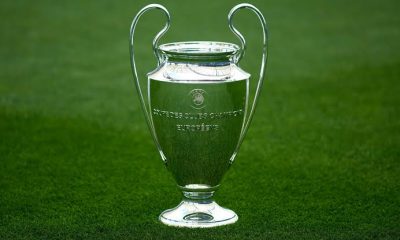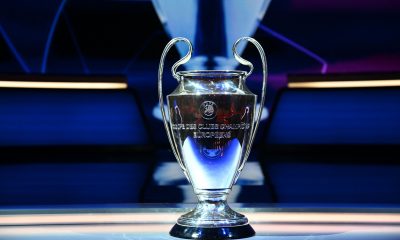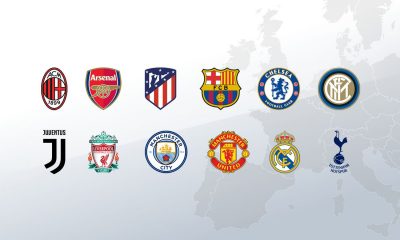Sports
Pele and 1970: How the greatest player of all time cemented his legend
Published
2 years agoon
By
FocusMag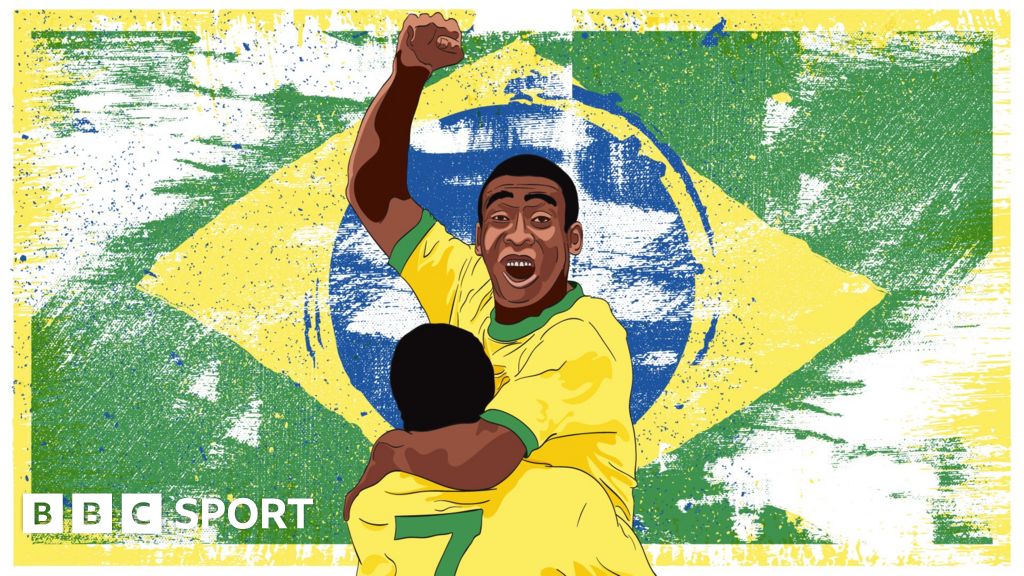
BBC Sports, in its World Cup icons series, tells the enchanting story of Brazilian legend, Edson Arantes do Nascimento, globally known as Pele, and his role in helping Brazil bring us the beautiful game in 1970.
As Brazil’s team bus weaves its way through the streets of Mexico City enroute to the Azteca Stadium for the final of the 1970 World Cup, the players on board joyously hammer out a samba beat. Every available surface, be it rain-flecked window, roof or unused seat, is an instrument.
Leading the way with his drum is singing winger Jairzinho, ‘The Hurricane’, scorer of a goal in every one of his team’s five games so far in the tournament, all of them victories.
Joining in is Roberto Rivellino, the graceful attacking midfielder and scorer of the first of the 15 goals that has taken them to the final; Carlos Alberto Torres, the strong-willed, brilliant captain who helped keep holders England at bay in the group stages; Gerson, Tostao, Clodoaldo and the rest, superstars of this unparalleled side, on their way to immortality.
The noise is too loud for everyone to hear a single rattle fall to the floor, the players too engaged in their singing and thoughts of glory to pay much notice to the man who intentionally dropped it.
Pele – the greatest player in the world, the talisman of the team – is crouched, hiding, tears streaming down his face.
Edson Arantes do Nascimento, known to the world as Pele, knew only success during the first eight years of his international career.
He was just 16 years old when he made a scoring debut for Brazil in 1957, against Argentina no less. In less than a year, he netted twice in the final against hosts Sweden as his country won their first ever World Cup.
Four years later, in Chile, injury would curtail his game time but not his legend as Brazil made it back-to-back triumphs in the world’s biggest tournament.
He was then undoubtedly the planet’s finest footballer – fast, strong, skilful, intelligent, improvisational and unselfish. He was a global star, who crowds would flock to see. He adored the game and it adored him back.
Such status comes at a cost, though. His was to become a marked man and over the summer of 1966 he would find that others in the sport were unwilling to tolerate his genius. It was at Goodison Park, the home of Everton Football Club, that he would have much of his love for the game kicked out of him. Literally.
Portugal defender Joao Morais would be the last in a line of hatchet men tasked with nullifying Pele by any means at that World Cup, his most brutal act a trip followed by a two-footed lunge that left the Brazilian forward powerless to influence what would be a 3-1 loss.
The result confirmed Brazil’s exit at the group stage and with it ended their proud, eight-year ownership of the Jules Rimet trophy in dire and hubristic fashion.
“A total, shameful failure” was how Pele later described it in his autobiography, adding: “Everyone thought we’d win with ease. But our preparations were not planned with the same humility as in 1958 or 1962. We were already starting to lose the title before we even set foot in England.”
Beaten, bruised and thoroughly disillusioned, he turned his back on the international game.
It was a hammer blow to Brazil. Pele’s power went beyond what he was capable of on a football field. He was a unifying force for a vast and multi-cultural country with large impoverished areas, from which he himself had emerged. He was a symbol of hope.
This was a man once declared a “non-exportable national treasure” following an emergency session of Congress when clubs from Italy came hunting his signature in his late teens.
His importance as a figurehead had only increased during a time of instability and uncertainty, with the country under military rule following the coup d’etat of 1964.
Relinquishing the World Cup was a blow. Losing Pele was unthinkable.
Time can be a great healer, as can perspective. Pele found comfort in both during the next few years and when attentions again began to turn to a World Cup he was a changed man to the one left reeling by his experience in England.
Fatherhood had helped to ease his dissatisfaction with football, while a tour to Africa with Santos and witnessing the huge, adoring crowds that gathered to see him – a black man – and his side gave him a new outlook on his importance as a role model.
He was also brimming with renewed confidence after a number of strong club seasons, during which he had taken his career goal tally to 1,000 – a moment of epic proportions in Brazil, where news of the great man reaching the landmark shared front pages with the Apollo 12 moon landing.
Pele was also not immune to that most gnawing of fears for all elite sports stars of wanting “not to end my career as a loser”.
Finally convinced to return to the national side by promises of greatly-improved preparation by the Brazilian Commission of Sports and a clampdown on foul play through the introduction of yellow and red cards for the tournament in Mexico, Pele’s decision was initially vindicated by a stellar qualification campaign.
He contributed six of the 23 goals scored as a settled, scintillating side won six out of six under coach Joao Saldanha.
However, calm confidence soon gave way to chaos, with the erratic Saldanha at the centre of it, seemingly determined to undo all the good work by clashing with the media, employing dubious match strategies – most damningly in a defeat by Argentina – and sacrilegiously questioning Pele’s place in the side.
His most ill-advised fight was the one he picked with General Emilio Garrastazu Medici, the president of Brazil’s military regime, who did not take favourably to being told to stay out of national team affairs.
Saldanha was sacked soon after, but refused to go quietly, aiming much of his vitriol in the direction of his former number 10, firstly stating he was short-sighted (which was technically true but clearly not detrimental to his game), before escalating his attack with unfounded claims that he was unfit and suffering from a “severe illness”, prompting a worried Pele to obtain reassurances from team doctors.
While Pele had no serious concerns on the pitch, off it was a different matter.
He was popular in Mexico. One previous visit to Guadalajara with Brazil had prompted nearly the whole town to close, with posters placed on street corners stating: “No work today, we’re off to see Pele!” But the country was politically volatile in the summer of 1970. The arrest of a group of Cuban-trained guerrillas by police led to a tip-off of a potential plot to kidnap Brazil’s star before the World Cup.
As a result, in the weeks leading up to the tournament, Brazil trained in a fortified camp, patrolled day and night by police and armed guards, with Pele himself hidden behind a circle of protection wherever he went.
That it did not have a detrimental impact was in part testament to the planning, which stretched back to friendlies played in Mexico as far back as 1968 and three and half months of dedicated preparation ahead of the tournament, including 21 days spent training at altitude.
When it came, their first game against Czechoslovakia at the Estadio Jalisco was a release, not just for the determined Pele but a focused, honed squad and 96 million expectant people back home.
Mexico 1970 was an explosion of colour, and no side possessed a richer palette than Brazil.
In a tournament televised live and in full technicolour for the first time to a global audience who only a year earlier had witnessed Neil Armstrong set foot on the moon, the balletic movement and sublime skill of those clad in vibrant canary yellow and cobalt blue was an apt giant leap into a bold and brilliant new footballing world.
Empowered to use their independence and intelligence as well as their ability by Saldanha’s successor Mario Zagallo, a former team-mate of Pele’s in ’58 and ’62, theirs was a football beholden to attack.
Blessed with a plethora of number 10s, Zagallo found a way to accommodate them all – Jairzinho and Rivellino operating in versatile wide roles, Tostao as a false nine and Gerson playing deeper in midfield.
At the centre of it all was Pele, a magnet for the ball on the field and for eyeballs off it, his every touch meaningful, his every forward run simmering with intent and possibility.
His game had always centred around control, pace, power and vision, but here they combined in perfect synchronisation with his evolution as a player.
In ’58 he was raw, in ’62 he was injured, in ’66 he was hampered but in 1970 he was experienced, fit, free and focused. This was uncut, flawless Pele and he dazzled like never before.
The opening game was a ferocious rebuttal to all those who had written him off, including Czech coach Jozef Marko who’s side took an early lead but was then left to rue describing the forward as a “spent force”.
An impudent nutmeg of Ivan Hrdlicka was a taster, followed soon after by him winning the free-kick from which Rivellino hammered Brazil level. Better was to follow. On the hour mark, the number 10 rose in the box to perfectly cushion Gerson’s pinpoint 50-yard pass in mid-air, steering it towards his landing before steadying himself to fire home. Jairzinho’s late double completed a 4-1 rout.
What many remember most from that game, though, was not the goal Pele scored, but the one he did not – an outrageous lob from inside his own half that beat Czech goalkeeper Ivo Viktor but sailed inches wide.
Surging with a confidence that comes from total control over one’s game, he would admit afterwards that it was pre-planned – devised after spotting that European goalkeepers had a tendency to wander from their line. His only regret was that he had not saved it for a more illustrious opponent, one of which was just around the corner.
England were the benchmark at Mexico 1970, the current holders that many felt had only grown stronger in the four years since their maiden World Cup triumph. For Brazil this was a ‘final before the final’. For Pele, it was also an emotional hurdle to clear.
It had been England celebrating in the summer of 1966 as Pele sat at home, nursing his bruised body and pride. Symbolically, this was the game in which he could finally lay all the frustration of four years ago to rest.
He did not disappoint in an extremely high-quality but also fiercely-contested encounter often boiled down simplistically to Brazil’s attacking flair versus England’s defensive ferocity. The English could also play, Brazil and their talisman equally able to mix it.
Alan Mullery, the man tasked with marking Pele, has since admitted to hitting the forward hard in the game to try and throw him off, but that he was physically and mentally equal to it.
In his autobiography Nobby Stiles, who watched on from the bench that day, wrote: “It was nothing less than daunting to see the ease with which Pele held off his marker. Repeatedly Mullers tried to hustle him off the ball. Repeatedly, he failed.”
Only twice, though, did Pele fully escape from the efficient Mullery’s dogged attention – the first resulted in arguably the finest save of all time, the second settled the game.
Gordon Banks’ save is part of English football folklore – a physics-defying leap to tip the ball over his bar from pretty much the whitewash of the goal-line. At the other end of the field, Brazil keeper Felix could only clap in appreciation. Pele himself described it as “the save of that tournament and of most other tournaments you could care to mention”. That the ball was propelled towards goal by the forehead of the world’s greatest player cements its legend.
Jairzinho scored Brazil’s winner but it was made by the skill of Tostao, who beat three England defenders before crossing, and the vision of Pele, who in one fluid movement in the tightest space shaped to shoot before flicking the ball to his right, perfectly into the path of the goalscorer.
“When Brazil scored their winning goal, we saw another vital aspect of Pele’s game – humility,” continued Styles. “It was best expressed in his understanding of the needs of the team. Pele cut out two England defenders with the simple pass that played in Jairzinho. That was pure Pele.
“His performances in Mexico surely represented his prime – you saw a talent that he had honed down to all the essentials of winning football. If a simple pass would work best for the team, he would play it. It was only if he was under pressure and lacking other options that he would launch some outrageous initiative. He was both the engine and the heart of Brazil, as well as being the ultimate example of that nation’s superb feeling for the game.”
England’s captain Bobby Moore, the man that had lifted the Jules Rimet trophy four years earlier, paid Pele the ultimate compliment at full-time, swapping shirts with him, prompting their now iconic topless embrace.
Brazil had their symbolic scalp but refused to rest on their laurels or compromise their principles. A 3-2 win over Romania – with Pele scoring twice via a fierce free-kick and neat, low finish – saw them top the group and set up a knock-out tie with Peru.
It would be a quarter-final for the ages, a meeting of like-minded South American rivals, fighting fire with fire. The Peruvians had the advantage of an insider at the helm in Didi, a former team-mate of Pele’s in the ’58 and ’62 World Cups. Ultimately, the Brazilians had the greater firepower, winning 4-2 in a display that further underlined their togetherness.
This was a unified Brazil, a family. Off the pitch a nightly ritual had begun, led by the devoutly Catholic Pele. The players would gather together to pray – for the sick, the poor, victims of the ongoing war in Vietnam, but never for victory. That they had to earn. To do so, they would next have to slay a demon from the past.
Pele was nine years old when Brazil lost to Uruguay – one of their great rivals – in the final of the 1950 World Cup on home soil.
What had begun as a day of hope and joy – the country alive with the sound of firecrackers and radios turned up to full volume – ended in despair and silence.
Coming in from his own game in the street, played with a ball made from a paper-filled sock tied up with string, Pele found his father in tears.
Dondinho, a talented semi-pro footballer himself, had nurtured his son’s love for the game, imparting technique and wisdom. Now the son saw an opportunity to offer something in return.
In his father’s room, he looked to a picture of Jesus on the wall. “If I’d been there I wouldn’t have let Brazil lose,” he declared. “If I’d been there Brazil would have won.” Twenty years later, he made good on the promise.
It didn’t start well. Uruguay led the semi-final in Guadalajara after 20 minutes. Midway through the first-half, though, Brazil began to play and, with a minute to go until the break, Clodoaldo equalised with his first international goal.
Pele had been relatively quiet but his influence on the game grew and grew. A brilliant, gliding run was ended by a crude tackle, a first-time shot denied by a scrambling Uruguayan keeper, another soon after flew just wide.
An injury-hit and tiring Uruguay, who had been taken to extra time by the USSR in the last eight, were broken when Jairzinho gave Brazil the lead with 15 minutes to go. The relentless Pele set up Rivellino for a third in the closing stages. There was still time for one final flourish from the number 10.
In stoppage time, Tostao’s through ball for Pele drew out Uruguay keeper Ladislao Mazurkiewicz, but instead of taking it around him the forward dummied, allowing the ball to run past both him and his opponent. Having been forced wide and to shoot first time because of a backtracking defender, Pele’s shot rolled agonisingly wide.
The result fulfilled Pele’s pledge to his father and left Brazil one game from glory.
With tears on his face and the repetitive beat of his team-mates’ batucada [percussive samba] filling his ears, Pele calms himself. This is not a time for doubt. He is the most established of his country’s players, a two-time world champion, a leader. Having undertaken such a journey to get here, he must not stumble now.
He picks up his rattle, rises once more to his feet and rejoins the mobile orchestra winding its way through the streets of Mexico City.
A few hours later, a photographer captures an image of the Brazil and Italy teams lined up in the Azteca Stadium before kick-off, 100,000 fans screaming at them from all sides of the sweltering cauldron in Mexico’s capital.
In it, the face of almost every player is forward and focused, every sinew seemingly stretched to control the simmering pan of nerves within. The exception is Pele, who stares to his left, straight down the camera’s lens with a look of unerring calm and confidence.
For the opening stages, Italy keep the door bolted, their solid catenaccio style doing its job. But in the 18th minute a chance arrives. Rivellino’s cross is hooked and hopeful, but it’s trajectory to the back post perfect. Pele has the run on Tarcisio Burgnich, his spring ensuring he rises highest to power home a precise header.
Pele leaps again, this time into the arms of Jairzinho, his fist pumping the air in delight.
Before half-time, a set-back. Brazil’s defence errs, Roberto Boninsegna emerging from amid the chaos to roll the ball into an unguarded net.
There is no panic at the break. Brazil are the fresher side after Italy’s marathon semi-final against West Germany four days earlier. They have the talent and tactical plan to take advantage.
Pele is inches away from a Carlos Alberto cross, Rivellino strikes the crossbar from a free-kick. There are 66 minutes on the clock when Gerson collects the ball on the edge of the box and fires a strike beyond the left hand of Enrico Albertosi and into the net.
Soon after, Gerson’s driven pass forward is met by the head of Pele – rising once more behind the bamboozled Burgnich, springs in his heels – to head down for Jairzinho to complete a full sweep of scoring in every game of the tournament. Italy’s challenge undone in six second-half minutes.
The next 15 minutes go by in a giddy blur, the carousel of yellow shirts dancing their way around a dejected foe.
The Italians are praying for the final whistle when Tostao tracks back to win the ball and lay off to Wilson Piazza, who then helps work it into midfield for Clodoaldo. The midfielder slaloms around four Italian challenges to find Rivellino, who’s forward pass releases Jairzinho down the left. He cuts inside to find Pele, who lays the ball off with perfect weight for Carlos Alberto to lash the ball first time into the far corner of the net.
It is a work of art. Perfection. A goal showcasing all that this Brazil stands for – teamwork, skill, improvisation, precision and planning. Zagallo had identified the Italian left as an area to exploit, but even he could not have imagined they would do so with such beautiful ruthlessness.
Once again at a crucial point there was Pele, his assist so simple yet exact in its execution, his selflessness never better exemplified.
Photographers encroach on the pitch in search of a perfect shot. At full-time, delirious fans flood on to embrace the Brazilian players, tearing shirts and shorts from them. Pele is one of many chaired around the ground shirtless, having removed his top himself to avoid having it clawed from his back and his head taken with it.
Back in the changing room, he once again seeks solitude from the carnival taking place around him, moving into the shower to pray. He had ended his international career in glory and for that he wished to give thanks. The peace did not last long. A journalist bundles his way in and kneels in front of him to beg forgiveness for the doubts about the forward he had put to print prior to the tournament.
Pele ushers him to his feet. “Only God can forgive,” he tells him. “And I am not God.”
Sometime later, when the dust had settled on Mexico 1970 and Pele’s exploits had already begun to seep into legend, Burgnich – the man tasked with attempting to man mark him in the final – was asked about the experience.
“I told myself before the game, ‘He’s made of flesh and blood, just like me.'” he reflected. “I was wrong.”
Pele: The Autobiography
Andrew Downie – The Greatest Show on Earth
Harry Harris – Pele: His Life and Times
Garry Jenkins – The Beautiful Team
BBC World Cup icons series
You may like
Sports
Barca Still Vulnerable in Europe, Xavi Admits
Published
1 year agoon
November 9, 2023By
FocusMag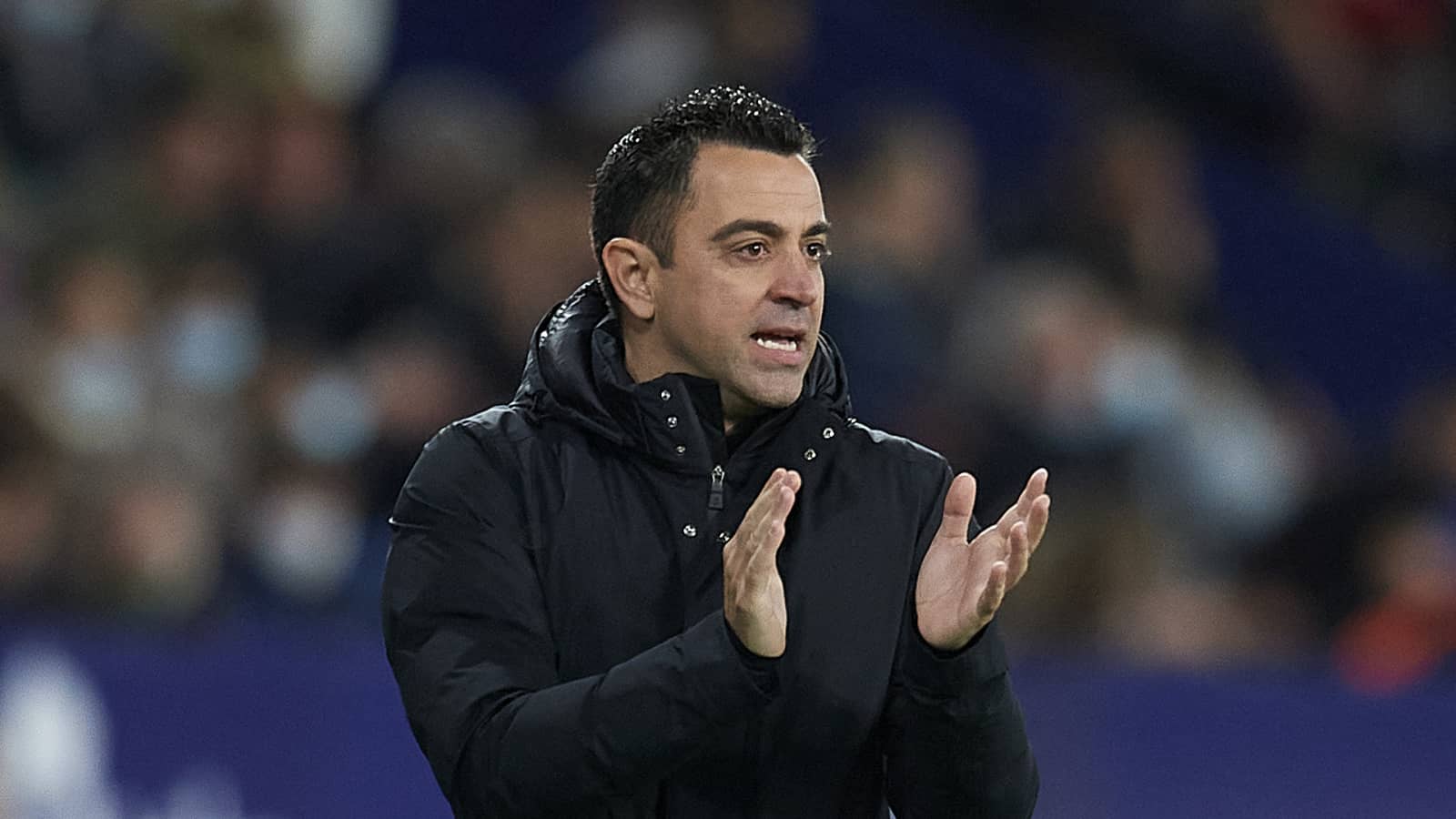
FC Barcelona might be threading a familiar path in Europe with the latest result where they slumped to a 1-0 defeat to Shakhtar Donetsk on Tuesday (07 November).
With this result, they spurned the chance to seal an early qualification to the Round of 16 Champions League knock-out stages.
FC Barcelona have struggled miserably in Europe since they last lifted the trophy in 2015, only reaching the quarter-finals in two occasions.
Danylo Sikan’s dipping header in the 40th minute secured Shakhtar a famous victory as Xavi Hernandez’s flat Spanish champions failed to trouble their Ukrainian opponents.
Barcelona still lead Group H ahead of Porto, second, hosting Royal Antwerp later on, with the Portuguese side able to pull alongside the Catalans on nine points with victory.
“We can see we’re in a bit of a footballing rut, we have to do a reset,” said Barca coach Xavi.
“We played a bad game, we have to admit it.”
Xavi said his team had wasted a good chance to progress.
“After two years without qualifying for the last 16, today is a missed opportunity,” he continued.
“It’s the most inopportune moment. There are a lot of demands (on us), I think that today we couldn’t fail and we failed.”
After failing to progress from the group stage for two seasons running, Barcelona saw this clash as an opportunity to get the job done with two games to spare.
However Shakhtar, playing their home games in Hamburg because of the Russian invasion of Ukraine, held their own from the start.
Barcelona missed big chances in the first match in October but this time Marino Pusic’s team shut down their uninspired visitors, who produced just one shot on target.
Xavi insisted his team’s performance in the narrow 1-0 league win over Real Sociedad on Saturday was unacceptable, despite the good result, but his team did not heed the coach’s words.
Shakhtar forced Marc-Andre ter Stegen into the first save of the game, with the German goalkeeper denying Mykola Matviienko at the near post after he got in behind Joao Cancelo.
Ilkay Gundogan and Raphinha lashed over from distance as Barca created no danger, with veteran striker Robert Lewandowski woefully disconnected on his return to Germany.
The former Bayern Munich forward has not scored in any of his last six appearances for Barca, amounting to his worst run of goalscoring form for over a decade.
The hosts took the lead a few minutes before half-time, easily slicing the visitors open when Giorgi Gocholeishvili took advantage of Barcelona left-back Marcos Alonso being a long way out of position.
The full-back crossed for Sikan, who beat Andreas Christensen in the air and headed beyond the reach of Ter Stegen.
Ter Stegen saved from Gocholeishvili early in the second half as Shakhtar continued as they left off.
Just before the hour Xavi took action, sending on speedsters Alejandro Balde and Lamine Yamal, as well as Pedri, looking to shake up his team’s lifeless display.
Barcelona were better but not bright enough, as Shakhtar goalkeeper Dmytro Riznyk enjoyed a quiet night.
“Not so long ago we were playing very good football — it’s a mental issue,” said Xavi.
Shakhtar’s latest young Brazilian winger, Newerton, scored a stunning second in the final stages but it was chalked off for offside — it would have been a superb way to crown a glorious night for Pusic’s team.
Barcelona had seven minutes of added time to work with but could not find a breakthrough, with Felix unsuccessfully appealing for a penalty after he was clipped on the edge of the box.
The Ukrainian champions, third, celebrated joyously at full-time and now sit only three points behind Barcelona, who host Porto in their next Champions League match on November 28.
“We do things step by step and we stay humble,” said Pusic, who was proud of his team’s defensive effort.
“We like to attack and we had several good moments tonight, but game organisation comes first.
“If you concede easily at this level there is not a high chance you will win.”
Barcelona midfielder Oriol Romeu said his team had to look in the mirror after their disappointing display.
“Every defeat is a warning,” he told Movistar.
“We have to be self-critical and see what we did wrong, to correct it quickly.”
www.focusmagazineonline.com with www.afp.com reports
Sports
Champions League: Man City, Real Madrid, Bayern qualify for UCL last 16
Published
1 year agoon
November 9, 2023By
FocusMag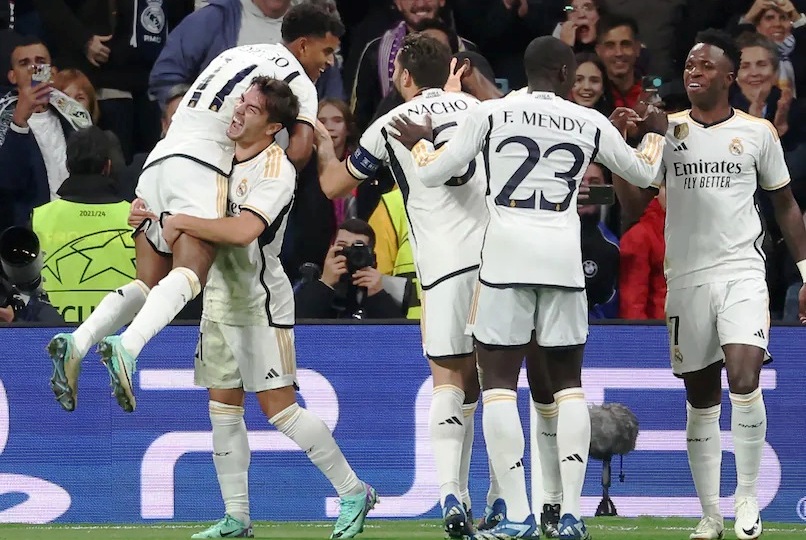
Expectedly, there were less drama as the record 14-time champions, Real Madrid joined holders Manchester City, last season’s runners-up Inter Milan, Real Sociedad, RB Leipzig and Bayern Munich, to qualified for the last 16 of the Champions League with two group games to spare.
However, Manchester United’s poor form continued as they slipped to a stunning 4-3 defeat against FC Copenhagen, just as FC Barcelona could not wrap up qualification, having to wait till matchday 5, before attempting to scale the hurdle.
Madrid, the record 14-time European champions, made sure of their progress from Group C with a 3-0 home win over Braga after surviving an injury setback just before kick-off.
There were grunting around the Santiago Bernabeu when starting Goalkeeper Kepa Arrizabalaga pulled out hurt in the warm-up, but his replacement Andriy Lunin excelled by saving Alvaro Djalo’s sixth-minute penalty.
With recuperating Starman, Jude Bellingham rested, to properly recover from the shoulder injury he sustained during the LaLiga game against Rayo Vallecano over the weekend, returnee Brahim Diaz gave Real a 27th-minute lead before the fantastic Brazilian duo of Vinicius Junior and Rodrygo both scored in the second half.
Rodrygo thanked Carlo Ancelotti for supporting him through a tough start to the season after scoring in Real Madrid’s 3-0 Champions League win over Sporting Braga on Wednesday.
Rodrygo, who hasn’t found the net in LaLiga since the first weekend of the season, but has now scored in consecutive Champions League games, ran to hug Ancelotti after scoring in the 61st minute at the Santiago Bernabeu.
“I’m very happy, it was a perfect game,” Rodrygo told Movistar. “I’m very happy with the goal and the assist, but also with the win and qualification.
“The hug was to thank Ancelotti. When you aren’t in a good moment, that’s when you see who people really are. I wasn’t in a good moment and he was always there with me. I scored and I had to celebrate it with him.”
Rodrygo has been an important player for Madrid in recent seasons, contributing to their 2022 Champions League and LaLiga double and scoring 18 goals in all competitions last season, but has struggled so far this campaign.
“In my career, there’ve been forwards who’ve scored in every game and others who have moments when it’s hard to score,” Ancelotti said in his postmatch news conference. “All you can do is support them. A player with Rodrygo or Vinícius’s characteristics will score sooner or later. They have extraordinary quality, it’s just a question of time.
“Vinicius and Rodrygo combined spectacularly in the second half. There aren’t many duos who can counter-attack like Rodrygo and Vinicius.”
Ancelotti admitted that playmaker Diaz, who returned to Madrid from AC Milan last summer, had been unlucky not to play more often.
“He showed great quality, defensive sacrifice, he did very well,” Ancelotti said. “That means he could have played more minutes. But [Jude] Bellingham has played in that position. Today Brahim replaced him very well.”
The coach said goalkeeper Kepa Arrizabalaga, who dropped out of the starting XI before kickoff and was replaced by Lunin, had felt “discomfort” in the warm up and would be assessed on Thursday.
Napoli are poised to go through from the group alongside Real despite being held to a 1-1 draw at home by Union Berlin.
Matteo Politano put Napoli ahead late in the first half but David Datro Fofana, on loan from Chelsea, equalised soon after the restart.
The result allowed Union to end a 12-game losing run but they cannot now qualify for the last 16.
Their Bundesliga rivals Bayern qualified with a 2-1 victory at home to Galatasaray, their 17th consecutive win in the Champions League group stage.
Thomas Tuchel’s side saw Galatasaray have a goal disallowed for offside before Harry Kane headed in the opener with just 10 minutes left.
Kane then added another, his 19th goal already for Bayern in just 15 appearances, before Cedric Bakambu pulled one back in stoppage time for Galatasaray.
“He’s a phenomenon and we’re proud that he’s playing in the team,” Bayern goalkeeper Manuel Neuer told broadcaster DAZN of Kane.
Galatasaray still stand every chance of going through from Group A after United lost in a remarkable game in Denmark.
Erik ten Hag’s team appeared to be cruising thanks to two goals in the first half an hour by their Danish striker Rasmus Hojlund.
Yet they suffered a blow when Marcus Rashford was controversially sent off in the 42nd minute for a foul on Elias Jelert, and Copenhagen took full advantage to haul themselves level by the break.
Mohamed Elyounoussi pulled one back before Diogo Goncalves equalised from the spot in the ninth minute of stoppage time.
Still United got back in front via a Bruno Fernandes penalty midway through the second half, but Lukas Lerager made it 3-3 seven minutes from time and Roony Bardghji, the 17-year-old Kuwait-born Swedish Under-21 international, got Copenhagen’s winner in the 87th minute.
Ten Hag’s team have now lost three of their four Champions League matches this season and have been beaten in nine of their 17 games in all competitions.
“I think first we played very good until the red card. The red card changed everything. Then it becomes a different game,” Ten Hag told broadcaster TNT Sports.
“I saw lots of positives, but in the end we lose some focus. It’s hard when you play so long with 10 men.”
Meanwhile, Arsenal are on the brink of progressing from Group B after a 2-0 home win over Sevilla, in which Bukayo Saka set up Leandro Trossard for the opener in the first half, and then added the second after the break.
“I’m really happy with the performance from the team. They showed aggression and commitment,” Arsenal boss Mikel Arteta told TNT Sports.
The Gunners are four points ahead of both Lens and PSV Eindhoven, with the Dutch side boosting their own hopes by beating the French side 1-0 thanks to Luuk de Jong’s early header.
Lens had substitute Morgan Guilavogui sent off late on.
In Group D, Inter secured their progress with a 1-0 win away to Red Bull Salzburg in Austria, a game settled by a late Lautaro Martinez penalty.
That result also allowed Real Sociedad to qualify after their earlier 3-1 defeat of Portuguese giants Benfica, who have lost all four matches in the group.
Mikel Merino, Mikel Oyarzabal and Ander Barrenetxea all scored in the first 21 minutes for the hosts, before Brais Mendez hit the post with a penalty. Rafa Silva pulled one back for Benfica.
www.focusmagazineonline.com with www.afp.com reports
Sports
Ancelotti returns to Napoli with Real to prove a Point
Published
1 year agoon
October 3, 2023By
FocusMag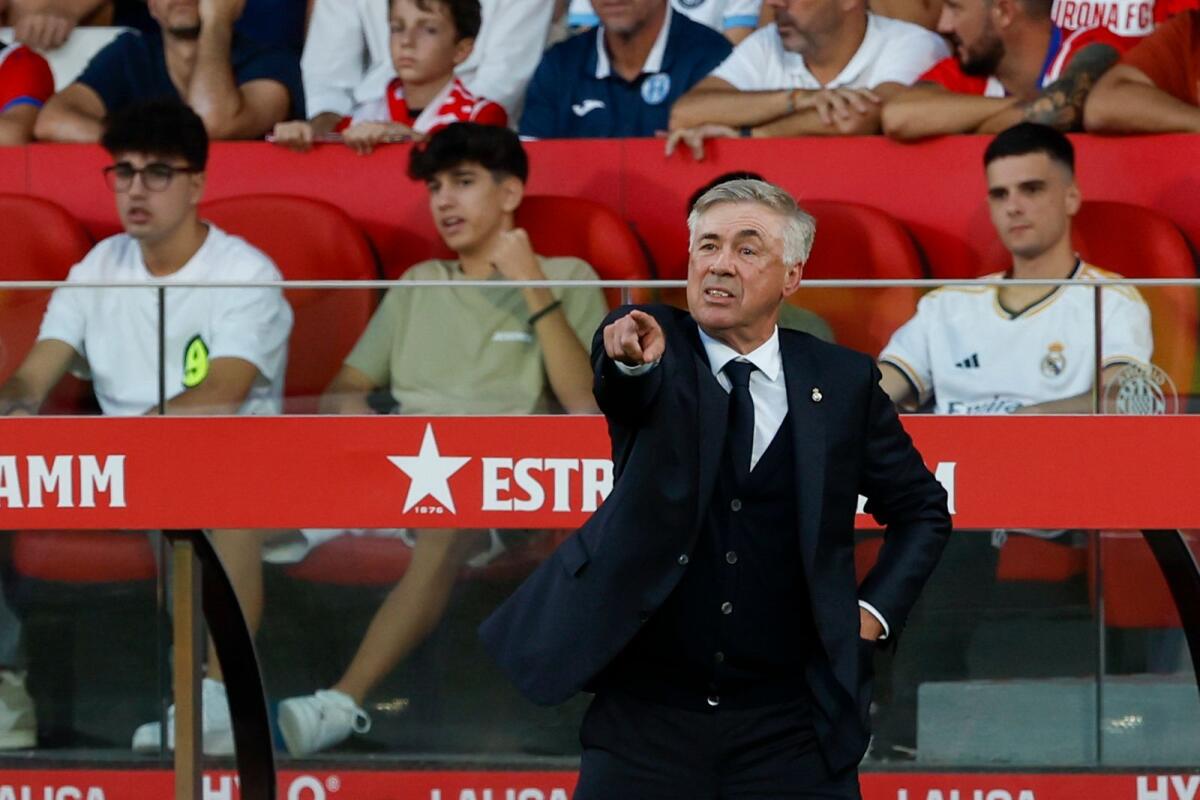
Fourteen times champions, Spain’s Real Madrid are set to play one of the most in-form teams in Italy in what promises to be their “toughest group-stage game”, as veteran coach, Italian Carlo Ancelotti, said on Monday (02 October) ahead of the huge Champions League clash.
LaLiga leaders Real began their quest for a record-extending 15th European Cup with a last-gasp 1-0 home victory over Union Berlin last month, while Italian champions Napoli, who are currently third in Serie A, won 2-1 at Sporting Braga.
Tuesday’s clash at the Diego Armando Maradona Stadium could be pivotal to both sides’ aims of taking top spot in group C.
“We’ll play against one of the best teams in Italy. They did very well last year. It will be a competitive and evenly matched game as they have a high level,” Ancelotti, who once managed Napoli, told a news conference.
“It’s going to be the toughest game of the group stage for us. I don’t want to say that we’re used to it, but the shirt of this club weighs on us.”
The match will also see Ancelotti return to Naples after he managed 73 games at the club from 2018 to 2019, leading the team in an unbeaten run in the Champions group stage before being sacked with the team in seventh place in Serie A.
“I had positive moments, it is a wonderful city. There were also less good moments, but I have the memory of a positive experience,” Ancelotti said.
“Backtracking before a game like this doesn’t make sense. When the relationship between a club and a coach doesn’t have the right feeling, it’s better to stop.
“I think it was the right decision for Napoli and for me, because two years later I came back to the best club in the world.”
Real Madrid coach Carlo Ancelotti is not a man to hold a grudge, as reflected by his return to the Spanish capital despite being harshly sacked by Los Blancos chief Florentino Perez in 2015.
However the 64-year-old veteran would doubtless enjoy proving a point when his Madrid side visit Napoli in the Champions League on Tuesday at the Diego Armando Maradona Stadium.
Ancelotti was axed by president Aurelio De Laurentiis in December 2019, less than an hour after helping Napoli reach the Champions League knock-out stages with a 4-0 thrashing of Genk.
The Italian side were struggling in seventh in Serie A at the time and won their first Scudetto for 33 years in 2023, so De Laurentiis will consider his decisions more than justified.
Ancelotti spent a year and a half in charge of Napoli, guiding them to a second place finish in the 2018-19 campaign, but his tenure was abruptly cut short in its sophomore year.
At the time it seemed Ancelotti had reached the game’s summit years earlier and was on the way down football’s food chain, with his next appointment at Everton appearing to confirm that.
Dressing room tensions and a dispute with De Laurentiis over a training camp led to his downfall in Campania. The president appeared to think Ancelotti did not have it in him to manage the squad.
However Ancelotti’s surprise return to the helm of Madrid in 2021 put him back among the elite, and in 2022 he won his fourth Champions League title as a coach, more than anyone else, as well as LaLiga to complete a superb double.
Meanwhile, Madrid’s 3-0 win at Girona on Sunday ensures they also arrive in Italy as leaders in LaLiga, after a wobble in the derby against rivals Atletico Madrid. A painful 3-1 loss at the Metropolitano on September 24 saw Ancelotti come in for criticism for his tactics and diamond midfield system.
However the Italian made some minor changes and it proved sufficient to earn a comfortable victory over the high-flying Catalans, who had hoped to score a second consecutive home win over Madrid at Montilivi.
“Winning here means that we did well and I’d like to highlight our defensive work, which was very good,” Ancelotti told reporters.
The coach deployed Eduardo Camavinga at left-back instead of the more attacking Fran Garcia, and also asked Jude Bellingham to help with covering Girona to ease the burden on Vinicius Junior.
“We put Bellingham on the outside to avoid Vini having too many defensive duties, bearing in mind that (Aurelien) Tchouameni was in the centre to provide cover,” added Ancelotti.
Bellingham has seven goals and two assists this season across all competitions, largely playing in the number 10 role, despite his capacity to operate in deeper areas.
It was an “invention” by Ancelotti to help cover for the departed Karim Benzema and so far it has paid dividends for the England international, top scorer in Spain.
The coach’s tactical shift and subsequent tweaks dispel any doubts over his dedication at Madrid, showing he is not just on cruise control and heading towards the Brazil national team job he is set to take next summer.
Part of the reason behind the new set-up is to add muscle to the team and bolster the midfield, after Manchester City demolished the record 14-time European champions in last season’s semifinal.
The visit to Napoli will be another acid test for both Ancelotti’s plan and Madrid’s squad depth, with striker Victor Osimhen in excellent form, despite his recent anger over the club insulting him on social media network TikTok.
Los Blancos are without injured defender David Alaba, leaving only Antonio Rudiger and Nacho Fernandez available in central defence.
Napoli coach Rudi Garcia will also be looking forward to the game – he was due to face Madrid when at Roma in 2016, but was sacked ahead of the last 16 tie.
Real Madrid and Napoli last met in the Champions League in the 2016-17 round of 16 when the Spanish giants won both legs 3-1 to and went on to claim the title.
www.focusmagazineonline.com with www.afp.com and www.reuters reports
Trending
-
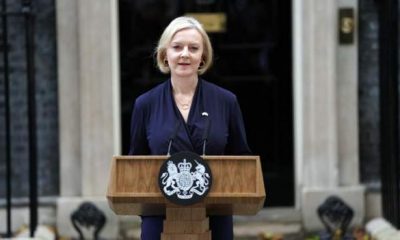
 Main Story2 years ago
Main Story2 years agoBREAKING: Liz Truss resigns as UK prime minister
-

 News2 years ago
News2 years agoSports: Messi misses out on Ballon d’or, Oshoala, Adeyemi in female, junior lists.
-

 Featured3 years ago
Featured3 years agoPolitics of Forced Congratulatory Messages Over Osun Guber Election
-

 Business2 years ago
Business2 years agoCurrency Redesign: Emefiele Unperturbed As Nigerians Groan in Pains
-
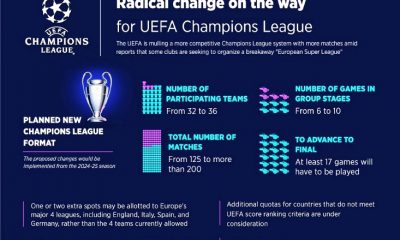
 Sports1 year ago
Sports1 year agoUCL format to change for 24/25 season: groups, knockout, league table
-

 Main Story1 year ago
Main Story1 year agoReal Reasons Makinde Refuses To Announce New Alaafin
-

 News2 years ago
News2 years agoBREAKING: Phyna is BBNaija season 7 winners
-

 Economy2 years ago
Economy2 years agoCBN’s Change of Naira Shocks Nigerians, EFCC Hail Moves Clampdown on Currency Hoarders

